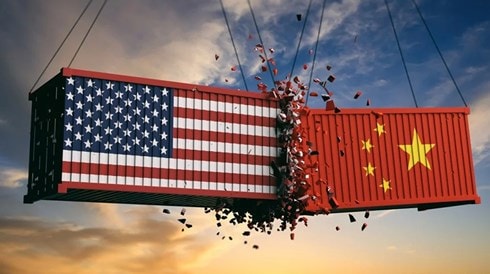China uses 4 tactics to beat the US in the trade war
Beijing still maintains its counter-tariff tactics with Washington, but if the US pushes further, China will have to use other, more dangerous "weapons".
Last week, the US fired another shot in the trade war with China when it announced a list of tariffs on $200 billion worth of goods imported from China. So far, Beijing has maintained its “one for one” strategy by imposing tariffs on US goods. The total volume of goods that the two countries taxed each other in June reached $34 billion. But if the US pushes further, China will have to use other, more dangerous “weapons”.
|
| (Illustration photo: SCMP) |
In theory, the US could impose tariffs on up to $505 billion worth of Chinese goods, equivalent to the total value of US goods imported from China in 2017. Meanwhile, China only imported $130 billion worth of goods from the US, so there is no way Beijing can respond “one for one” to US President Donald Trump’s tariff tactics.
But that doesn’t mean China is helpless. In fact, if it resorts to non-tariff measures, the “weapons” China has in its hands could do more damage to the US economy than the other way around.
“China has a much larger arsenal than the US,” said Kristina Hooper, chief global market strategist at Invesco. “Tariffs are just the tip of the iceberg of what China can do.”
According to CNBC, below are four options for responding with non-tariff measures that China can apply:
1.Stop buying US government bonds
China is one of the countries that holds the largest amount of US government bonds, about 1,000 billion USD of bonds in 2017 (according to data from the US Federal Reserve - FED).
Beijing could sell, or even stop buying, US government bonds, which would have a significant impact on the world’s number one economy. According to Ms. Hooper, this option would be like China dropping a “nuclear bomb” on the US economy.
As China sells large amounts of US government bonds, their value will plummet and push up yields, meaning the US government will have to borrow at higher interest rates and could plunge Washington into a new debt crisis.
But there is a reason Beijing has not resorted to such measures: China would also lose if US bond prices fell, while it has no safe alternative to the US dollar.
However, if China really wants to harm the US economy, this measure is extremely effective, especially in the context of the US Government already suffering from a huge budget deficit (expected to reach 804 billion USD in fiscal year 2018 - according to the US Congressional Budget Office), so Washington can hardly bear this additional pressure.
2.Devalue the Yuan
This may be China’s best tool to counter the US. “Currency is the most useful lever to counter the impact of tariffs,” said Salman Baig, investment manager at Unigestion, a Swiss investment firm.
If the renminbi depreciates by about 8%, which it has since mid-March 2018, US importers will see prices of Chinese goods increase by 2%.
China also doesn’t need to devalue its currency too much on its own, as that would push interest rates down, which would devalue the yuan further, Hooper said. A currency depreciation is often a result of tariffs, and the more tariffs imposed, the more the currency depreciates.
Of course, China doesn’t want a currency that’s too volatile. But Baig says Beijing is willing to let the yuan depreciate by another 2% to 5% in the short term, as long as it does so in an orderly manner.
3.Making things difficult for American companies
The Chinese government does have the power to stop its people from buying American goods or traveling to America. The one who learned that lesson for Washington was its ally Seoul.
When Seoul agreed with Washington to deploy the Terminal High Altitude Area Defense (THAAD) system on the Korean Peninsula, South Korean automakers lost market share in China and many other companies were affected. The Chinese government did not even have to issue any regulations prohibiting people from buying Korean goods; the Chinese people themselves voluntarily did so to support the country.
In addition, any money flowing out of China must be authenticated, and the Chinese government can easily slow down this process for American companies, not to mention measures that make it difficult to issue visas or tighten regulations for American companies.
4.Isolate the US on trade
China could also push for trade deals with other countries around the world and isolate the US, which Beijing is already doing with Europe and Canada.
If it really wanted to shock the US, China could even join the old Trans-Pacific Partnership (TPP), now the Comprehensive and Progressive Agreement for Trans-Pacific Partnership (CPTPP), which US President Donald Trump himself withdrew from. Then tariffs between China and the 11 CPTPP member countries would be reduced or eliminated entirely.
“Imagine if China decided to join,” said Mr. Baig. “It would be a massive global trade deal.”
This is a long-term solution and will not happen overnight, but Mr. Baig believes that it is also an effective "weapon" if China wants to beat the US in this trade war.
As the US is also waging other trade wars with Canada, Europe and several other countries, many countries around the world may be ready to form new trade alliances and leave the US behind.

